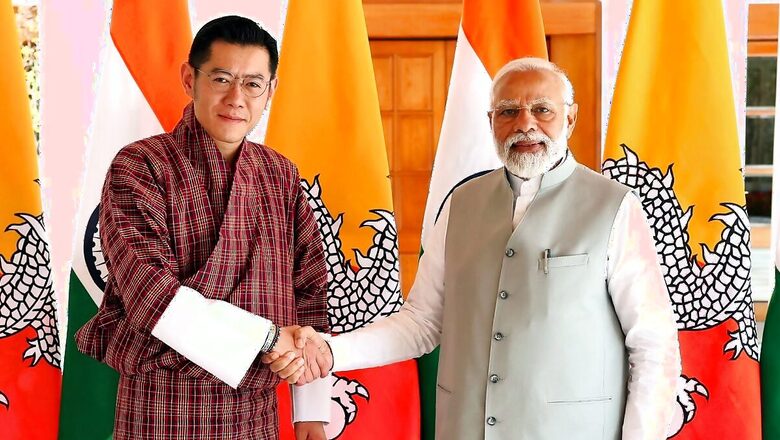
views
The Bhutanese King Jigme Khesar Namgyel Wangchuck will be on a week-long official visit to India from November 3 to 10, a significant trip amid the recent boundary negotiations between Bhutan and China.
The Royal visit includes scheduled meetings with Prime Minister Narendra Modi, External Affairs Minister S Jaishankar and other top officials.
“India and Bhutan enjoy unique ties of friendship and cooperation, which are characterised by understanding and mutual trust,” said a Bhutanese official statement, announcing the visit, and highlighting the significance of the trip.
Interestingly, the visit comes on the heels of the 25th Round of Boundary Talks between Bhutan and China in Beijing which the Bhutan side described as having been conducted in a “warm and friendly atmosphere.”
The two nations signed an agreement on the responsibilities and functions of the Joint Technical Team (JTT) concerning the Bhutan-China boundary.
Bhutan’s Foreign Minister Tandi Dorji, during his meeting with Vice Foreign Minister of China Sun Weidong, expressed the commitment of both countries to “build on the positive momentum.”
Another significant discussion the Bhutanese side had with China, was on the prospect of establishing diplomatic relations between the two countries. While there has been no official word from Bhutan on this, the Chinese Foreign Ministry’s release said that during the meeting of Bhutan’s FM Dorji and Chinese Vice President Han Zheng, “both sides agreed to accelerate the boundary demarcation process and the establishment of diplomatic relations between the two countries”.
Bhutan and China have been having boundary talks since 1984. Both sides have conducted twenty-four rounds of talks at the ministerial level and the last such meeting happened seven years ago in 2016.
In addition, both countries have also held 13 rounds of Expert Group Meetings (EGM) as well discuss boundaries and the latest of this was held in Beijing, China from August 21st to 24th, 2023.
During the August meeting, both countries announced the establishment of the Joint Technical Team on the Delimitation of Bhutan-China Boundary, which the Chinese side highlighted as “One of the important outcomes” of the meeting. The two sides have also agreed to take “simultaneous steps” to implement a “Three-step Roadmap” designed to lead to the demarcation of the boundary
China’s border discussions with Bhutan have implications for India as well. The strategic Doklam Tri-Junction is in proximity to the Siliguri corridor, a vital link for India. Recalling the military stand-off in 2017, India had emphasised that the tri-junction boundary determination would involve all three countries.
Last year, Bhutan and China initiated a ‘Three-Step Road Map’ for their boundary negotiations. The details remain undisclosed. Bhutanese Foreign Minister Tandi Dorji, while speaking on the Doklam issue to the Belgian daily La Libre in March this year, had said, “It is not up to Bhutan alone to solve the problem. There are three of us. There is no big or small country, there are three equal countries, each counting for a third.”
His statements stormed into media headlines in India and were construed as a shift in Bhutan’s stance on the issue, drifting away from the three-country involvement in resolving the Doklam issue.
Days later the Bhutanese King was in Delhi. He held talks with Prime Minister Modi, EAM Jaishankar and senior government officials. The joint statement did not mention anything on boundary talks and reiterated, “India and Bhutan share an exemplary bilateral relationship characterized by trust, goodwill and mutual understanding at all levels, strong bonds of friendship and close people-to-people contacts”.
After the 2017 Doklam Standoff with India, the Chinese government has expedited a possible resolution of boundary issues on the Bhutanese side. India- China talks on boundary disputes have become complicated since the 2020 Galwan Clash.
A massive military standoff along the Ladakh border, since then has affected the bilateral ties adversely. China’s recent assertion over territories like Arunachal Pradesh and Aksai Chin in its 2023 edition of the national map has added another dimension to the region’s geopolitics.
During his recent visit to the USA, EAM Jaishankar described the India-China relationship as an “abnormal state” since the 2020 Galwan clash, saying it is a “possibly longer than medium-term issue”.
The Bhutanese King’s visit to India and the recent Bhutan-China discussions underscore the delicate balance of power and strategic interests the Himalayan Kingdom is looking for in the region. With Bhutan being a traditional friend, and China emerging as a strong strategic rival, New Delhi closely monitors any Chinese contact with Bhutan’s government.
The ongoing interactions between Thimphu and Beijing may indeed be causing some unease with India and the King’s visit may help alley the apprehensions of Delhi and keep the bilateral relations steady and balanced.




















Comments
0 comment